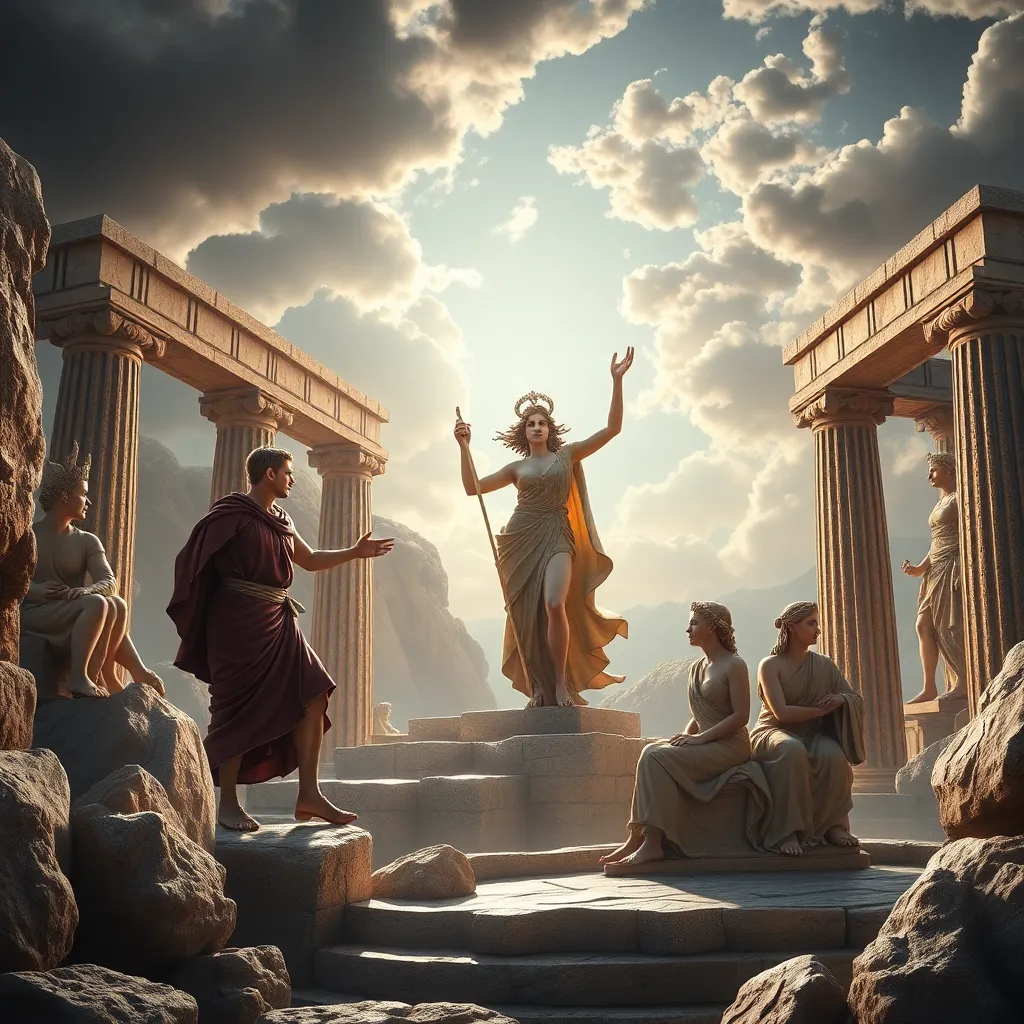Hera’s Role in the Birth of Athena: A Unique Perspective
I. Introduction
The birth of Athena is one of the most fascinating tales in Greek mythology, shrouded in mystery and intrigue. Athena, the goddess of wisdom, warfare, and crafts, is a pivotal figure within the pantheon of Greek deities. Her birth is not just significant for its miraculous nature but also for the intricate dynamics it reveals among the gods, particularly the roles played by her parents, Zeus and Metis, and the influential Hera.
Hera, the queen of the gods, often overshadowed by her husband Zeus, has a unique and complex role in the narrative of Athena’s birth. This article aims to explore Hera’s influence and her unique position in the mythological context surrounding Athena’s arrival.
II. The Mythological Context of Athena’s Birth
Athena’s parentage is a critical aspect of her identity. She is the daughter of Zeus, the king of the gods, and Metis, the goddess of wisdom and cunning. This lineage not only signifies her association with intelligence and strategy but also sets the stage for a significant prophecy that would shape her existence.
The prophecy foretells that Metis would bear two children, the first being a daughter who would be wiser than her father, followed by a son who would dethrone Zeus. To prevent this potential rivalry, Zeus, fearing the loss of his power, swallowed Metis while she was pregnant with Athena. This act of swallowing Metis is paramount, as it leads to Athena’s unprecedented birth from Zeus’s head.
Hera, being Zeus’s wife, occupies a prominent position among the Olympian gods. Her status and influence are crucial for understanding the dynamics of divine relationships and the implications of Athena’s birth.
III. Hera’s Relationship with Zeus
The relationship between Hera and Zeus is tumultuous and complex. As the queen of the gods, Hera is often depicted as jealous and vengeful, especially in response to Zeus’s numerous infidelities. Despite her high status, her marriage is marred by Zeus’s constant betrayals, which create a backdrop of tension and drama.
- Dynamics of Marriage: Hera and Zeus’s marriage is frequently characterized by power struggles, with Zeus often dominating.
- Infidelities: Zeus’s romantic escapades lead to various offspring, including gods and mortals alike, which fuels Hera’s jealousy.
- Impact on Athena: Hera’s feelings towards Zeus’s actions have significant implications for Athena, given her unique birth circumstances.
IV. The Role of Metis in the Birth of Athena
Metis, as the goddess of wisdom and cunning, plays a vital role in Athena’s narrative. Her relationship with Zeus is emblematic of both strength and vulnerability. After the prophecy, Zeus’s actions towards Metis highlight a theme of control and fear of potential threats.
Metis’s fate is particularly significant because it reflects the intersection of wisdom and feminine power in mythology. When she is swallowed by Zeus, it symbolizes the suppression of feminine wisdom, yet it also leads to the miraculous birth of Athena, who embodies those very qualities.
V. Hera’s Involvement in the Birth Process
The myths surrounding Athena’s birth are rich with symbolism. Athena is born fully grown and armored from Zeus’s head, a unique birth that underscores her status as a goddess of wisdom and warfare.
While Hera is not directly involved in the physical act of Athena’s birth, her influence is subtly woven into the narrative. The circumstances of Athena’s emergence can be interpreted as a reflection of Hera’s feelings—both of jealousy and protection over her husband’s actions and their consequences.
VI. The Symbolism of Hera’s Role in Athena’s Birth
Hera’s role in Athena’s birth offers a thematic exploration of motherhood, femininity, and the complexities of female relationships in mythology. While Hera embodies jealousy, she also represents protection and the traditional aspects of motherhood.
- Motherhood and Femininity: Hera’s status as a mother figure contrasts sharply with Athena’s independent and warrior-like attributes.
- Jealousy and Protection: Hera’s jealousy of Zeus’s infidelity complicates her relationship with Athena, who is born out of the circumstances of that infidelity.
- Contrasts in Womanhood: Athena, as a goddess of wisdom and warfare, stands in stark contrast to Hera’s traditional femininity, highlighting the diverse representations of women in mythology.
VII. The Aftermath: Hera and Athena’s Relationship
Following Athena’s birth, her status among the Olympian gods is elevated. She becomes one of the most revered deities, known for her wisdom, bravery, and strategic prowess. However, the complexities of her relationship with Hera linger.
Athena and Hera’s interactions are marked by tension, reflecting the broader themes of motherhood, rivalry, and the implications of divine power dynamics.
Some key points include:
- Athena’s Status: Athena earns a place of respect among the gods, often acting as a mediator in conflicts.
- Interactions with Hera: Their relationship is complex, sometimes marked by conflict due to Hera’s jealousy and Athena’s independence.
- Impact on Mythology: The dynamics between Hera and Athena enrich the narratives of Greek mythology, showcasing the multifaceted roles of female deities.
VIII. Conclusion
Hera’s unique role in the birth of Athena is a fascinating aspect of Greek mythology that reveals the complexities of divine relationships and the multifaceted nature of femininity. While Hera may be seen as a figure of jealousy, her influence is undeniable in the narrative of Athena’s birth.
This exploration offers a broader understanding of female figures in mythology, highlighting how their relationships and individual characteristics shape the stories that resonate through time. Hera’s legacy, intertwined with Athena’s emergence, continues to captivate and inspire, reflecting the enduring power of these mythological figures.




